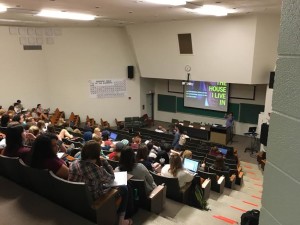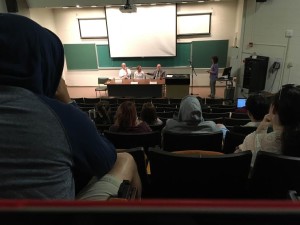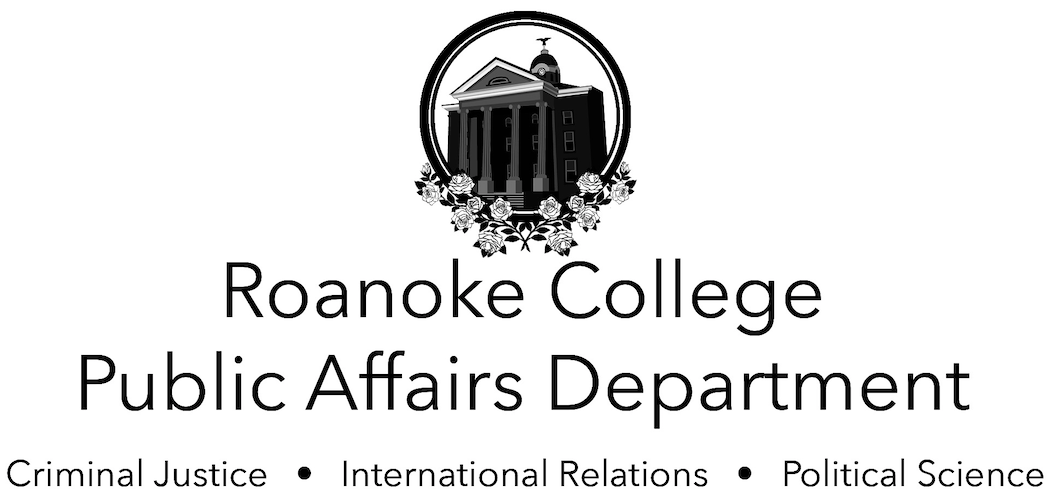 On Thursday, March 17, Dr. Pruss (a criminal justice professor within the Department of Public Affairs) organized a film screening and panel discussion as an activity the students and community could attend to not only gain an interesting perspective on the drug war, but to also listen to some prominent figures in our community that deal first hand with this every single day.
On Thursday, March 17, Dr. Pruss (a criminal justice professor within the Department of Public Affairs) organized a film screening and panel discussion as an activity the students and community could attend to not only gain an interesting perspective on the drug war, but to also listen to some prominent figures in our community that deal first hand with this every single day.
The three voices from the community were Judge David Carson, Officer Jessica Wilkerson, and Blue Ridge Behavioral Health worker. Carson is a judge on the Roanoke Valley Drug Court, and is a graduate of Dartmouth College as well as Washington and Lee. Jessica Wilkerson is an officer with the Roanoke City Police Department. He works heavily on drug work related cases, and is certified to teach at the police academy. Earl Edwards, who is a native of the Roanoke Valley, has worked with Blue Ridge Behavioral Health Care for thirty years. With all of them being well educated on the drug war and having first hand experience, they answered a variety of questions from the student and community field audience. Although, before this post discussion was the film itself that opened everyones’ eyes from the beginning.
The film took a different perspective on the war on drugs, and suggested that it has never been about drugs itself. The beginning arguments suggested that the drug war initiated from racial tension throughout the nation. For instance, they reference the first crackdowns on three drugs: opium, cocaine, and marijuana. In this reference, the film suggests that cracking down on these drugs was a way to criminally isolate the Chinese (who allegedly were stealing white american work on the west coast), African Americans with cocaine, and Hispanics with marijuana (another instance where hispanics were dominating agricultural jobs whites previously worked). Thus, the beginning part of the film certainly suggested that there has been a racial tie with the drug war throughout history. Other references throughout the film gave light on the fact that many people involved with drugs come from situations of extreme economic distress, and they view it as a way to support themselves. Furthermore, a third of the film focused on the crackdowns our government has made on drugs, and made the audience question whether or not they are too harsh.
The powerful message that the film portrayed caught the interest of the panel discussion leaders. Although they mutually agreed that some of the references in the film may have been a little extreme, it was fair to say that they felt they were very important topic discussions. They proceeded to give their personal takes on the issue, and how their experiences from their profession may alter their point of view. For instance, officer Wilkerson openly stated that she knows that her point of view is going to be automatically different from Carsons’ and Edwards’. Wilkerson said “our job is to enforce the law, plain and simple. It is my job to constantly remember what the law is, no matter what it may be, and enforce it”. Edward mentioned that he liked the fact that film pointed out injustices throughout the history of the drug war, but he wished they would have shed more light on treatment. To further, he stated “throughout the entire film, I only hard the word treatment twice. It is hard for to fully engage on the makeup of the film because the treatment process is my profession and I think it is very important”. Lastly, Judge Carson talked about his great appreciation for the Roanoke Valley having a Drug Court, and wanted the audience to be appreciative of it as well. He mentioned the reason having a Drug Court is so great is because it gives him some freedom to make his own decisions about sentencing for crimes. Carso
Wilkerson said “our job is to enforce the law, plain and simple. It is my job to constantly remember what the law is, no matter what it may be, and enforce it”. Edward mentioned that he liked the fact that film pointed out injustices throughout the history of the drug war, but he wished they would have shed more light on treatment. To further, he stated “throughout the entire film, I only hard the word treatment twice. It is hard for to fully engage on the makeup of the film because the treatment process is my profession and I think it is very important”. Lastly, Judge Carson talked about his great appreciation for the Roanoke Valley having a Drug Court, and wanted the audience to be appreciative of it as well. He mentioned the reason having a Drug Court is so great is because it gives him some freedom to make his own decisions about sentencing for crimes. Carso
n said he loves the ability to follow oversee somebody, view all angles of the spectrum, and then arrive at a sentence rather than just issuing a sentence off a federal mandate for that crime.
The event was rounded up be a series of question and answers from the audience, and many students and community members even stayed after to ask the panel members individual questions and thank them for their attendance.
